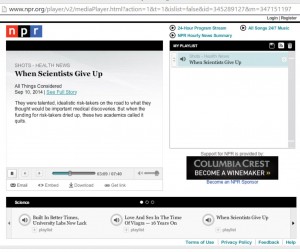When Scientists (and science educators) Give Up
A few days ago I listened to “The Current” show on CBC radio with a Canadian astronaut and a very prominent figure for many Canadians – Chris Hadfield . The show was devoted to science education and it raised considerable interest. Chris Hadfield defined science in the show as a formalized curiosity. I liked that definition – as curiosity, in my view, is at the heart of science. Today, I just listened to the NPR shows called “When scientists give up“. It was aired on one of my favourite shows “All Things Considered”. The story is about doing research in the environment where the competition for grants is so fierce that many scientists spend days and months writing grants, knowing that they have little chances to get them… The story mainly focused on biomedical sciences and people who earned PhD’s and then decided to give up their science careers. The show is about science funding, about persevering and about the government’s support of science.
However, I can say similar things about education or more specifically science education. Moreover, when people (many of them are scientists) are looking down at educators and science educators and do not consider science education to be important, they forget that science educators produce the people who will become our government and who will be deciding how to fund science. This is a huge issue, in my view, and this is why I think science education for the general public is so important.
I am currently working on writing a SSHRC (Canadian funding agency for social sciences and humanities) grant focussing on science teacher education. I think it is a very important field. I also know that the funding success rate is about 20%. Thus, I wasn’t awarded the funding last year even though my project was recommended for funding (there wasn’t enough money to fund all the projects recommended for funding). Is it a good use of my time to be fighting for funding in such a hostile environment? Should I start playing games and instead of writing the grant about the issues I really care about, write a more “politically correct grant”? Should I keep taking risks? Will I persevere?
What keeps me moving is the realization that if I give up and I will not be working with future and practising teachers the way I do, it will affect many-many future students. I know from my students (from both anonymous evaluations and informal feedback) that my courses make a difference for teachers – they inspire them and equip them to be better science educators. This makes it all meaningful for me and helps me to keep going.
However, funding is what enables me to do research and how I am judged by my department and my colleagues. Funding is the key to success at a research university, like UBC. If I cannot secure funding, my future here is in jeopardy and it doesn’t matter how well I teach and how big a difference I make in science education in BC or even in Canada. So what is the solution for people like me in the climate that is anti-science and especially anti science education (in Canada science and science education funding is 10 times worse than in the US – we do not have NSF or another federal agency recognizing science education funding as one of the key venues for having a healthy society)?
Most importantly, will the funding squeeze in Canada push people who are willing to take risks out of the science and science education environment (our out of Academia) or will we persist and persevere? It is a million dollar question for me… I also found the comments to the story very interesting: http://www.npr.org/blogs/health/2014/09/09/345289127/when-scientists-give-up I do not agree with many of them, but they certainly worse looking at.
